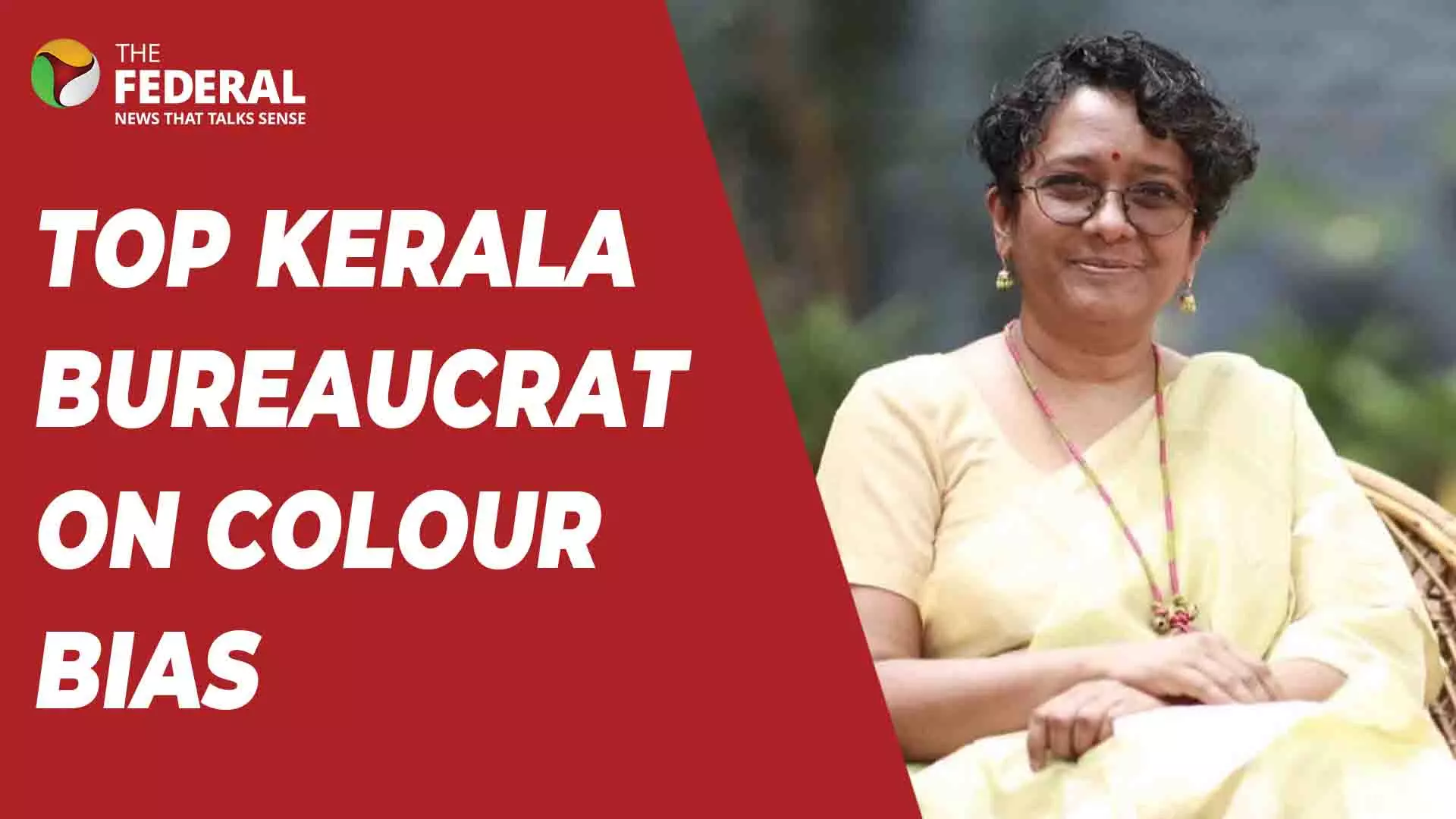
Interview: What made Sarada Muraleedharan write viral post on colour bias
Kerala Chief Secretary, in an exclusive interaction with The Federal, talks about skin tone prejudices, and how Gen Next is showing promise of a better outlook

Kerala Chief Secretary Sarada Muraleedharan has sparked an important public conversation on the intersection of colour bias, gender, and societal perception.
In a candid interview with The Federal, Muraleedharan shared how deeply rooted biases still shape how women — especially those in power — are judged not for their work but their appearance. Her Facebook post on the issue recently went viral, encouraging thousands to reflect on the discrimination that often begins at home and persists in professional spaces.
Judging women unfairly
Muraleedharan emphasised that while men also face appearance-based stereotypes, women are judged by a far narrower lens. “The moment women step into roles that are not conventionally assigned to them, appearance becomes a dominant factor,” she said. This standard, she explained, isn’t one women created for themselves but are still held up against.
Also Read: 'Normalize Indian Hate': Elon Musk rehires DOGE key staff despite racist tweets
"It's not the standard we created, but we still are gauge against that standard. Appearance, physical appearance has quite a bit to do with that. People have this tendency to gravitate towards what they think looks good, looks beautiful, looks elegant, looks polished, looks sophisticated, because there are all good values associated with all of this. There are definitions of what is beautiful, what is pretty,” she noted, pointing out that society often equates good looks with elegance, polish, and sophistication — values that unfairly leave many women behind.
Bias begins early
Addressing the roots of colour-based prejudice, Muraleedharan explained how this begins in childhood. "In response to my post, numerous people from all walks of life, people whom we regard as successful, homemakers, and also men, said this is a narrative that they've been hearing from their own childhood. Your colour is a counterpoint to the colour of your parents or somebody in the family,” she said.
Children grow up internalising these comments and form negative beliefs about themselves early in life.
Also Read: UK PM discusses racism, reveals parents urged him to speak without an accent to 'fit in'
Muraleedharan also stressed how families often unintentionally convey that darker skin is a disadvantage. The issue, she believes, lies in viewing one’s skin tone as a limitation in the first place.
She pointed out how historical social constructs, class, caste and manual labour have all contributed to this perception. “Working in the sun, playing in the sun — blackness comes from being outdoors. And unfortunately, for us, a lot of manual work is associated with communities who are, who are out there and who do not live in places or work in spaces protected from the sun. Therefore, we are already making a distinction between who are being out there and doing hard arduous work of blue collar and the ones who are the white collar."
As a result, fair skin became associated with privilege and protection, while darker skin became linked to caste and marginalisation.
Equity, not ideals
For Muraleedharan, challenging these ingrained standards is about equity. “The ideal itself has to be a many-splendored thing,” she said, calling for the promotion of diverse definitions of beauty that go beyond fair skin and conventional looks.
She also criticised the entertainment and beauty industries for promoting a single standard. “If our standard of beauty does not include black, then we will exclude black,” she said, calling for representation across size, colour, and identity.
Also Read: Tremor: Teju Cole’s trembling reflections on blackness in the history of art
From personal to professional
One of the key motivations for her viral post, she revealed, came from a moment when her own skin tone was used to comment on her administration. “It wasn’t just about the colour of my skin — but putting that colour onto the colour of my administration,” she shared. Though not necessarily meant to be derogatory, she felt compelled to respond.
Writing the post was cathartic. “I needed to just bring it out. And writing is a way of catharsis,” she said.
Also Read: King Charles visits Kenya, Britain faces racism accusations
A hopeful future
Encouragingly, Muraleedharan sees hope in the younger generation. While social media can reinforce toxic standards, she believes it also opens up new possibilities.
“It’s bringing in cosmopolitanism…exposure to thoughts, conversations, narratives that the older generations have not had the luxury of being,” she observed, adding that today’s youth are more informed, inclusive, and sensitive than past generations.
Telling dark-skinned women to believe in their own beauty, she said, “Look at yourself and search for the beauty that is there. It is there—it’s just that you’ve been conditioned not to see it.”
(The content above has been generated using a fine-tuned AI model. To ensure accuracy, quality, and editorial integrity, we employ a Human-In-The-Loop (HITL) process. While AI assists in creating the initial draft, our experienced editorial team carefully reviews, edits, and refines the content before publication. At The Federal, we combine the efficiency of AI with the expertise of human editors to deliver reliable and insightful journalism)

